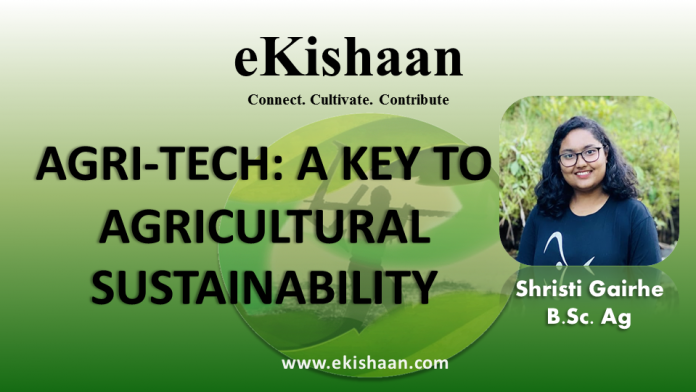AGRI-TECH- ‘A KEY TO AGRICULTURAL SUSTAINABILITY’
Agri-tech is the application of the technology for the aim of improvement of farming through information monitoring and analysis of the cultivation practices. Agri-tech aims to open new opportunities and solve the problems regarding the productions, traceability and preservation of natural resources. It enhances the technological innovations with the data collection which provides a slot to improve the traditional forms of agriculture and farming and continue to transform food production with the innovative forefront. Agri-tech ensures the use of technology in the field of agriculture, horticulture and aquaculture.
A growing population, disturbed urbanization,change in climate and globalized trades are few megatrends that has impacted agriculture and are approached with the observational startup regarding the expansion of agricultural technology (Agri-tech). Advancement in the agritech startup is widely recognised as one of the most effective ways to alleviate poverty, improve food security and reduce hunger and malnutrition. Sustainable agriculture is the ability to produce enough agricultural products to meet the present needs without endangering the environment,public health or economic profitability. Innovative solutions regarding the agri-tech has enhancing benefits for sustainable farming.
Innovative IOT based software for tracking weather conditions, Information communication technologies (ICT) for bridging the gap in agriculture sector for farmers and agri-preneurs also get detailed information about soil health fertilizers used and information about foods are organically grown or not. Agricultural biotechnology helps in developing synthetic fertilizers and genetically modified seeds which leads to increase in production. Food products with high protein and fibre content are examples of the sustainability in the agricultural products. Novel farming,smart farming,presicion farming, site specific crop management (SSCM) including vertical farming,indoor farming and growing fresh products in high tech greenhouse which helps in less use of natural resources. Agri-tech donot only contribute to the development of food but also the bio energy and biomaterials.
There are many innovatives solutions in agritech which implements sustainable farming. Development in technology guides the farmers to pave the way of traders and consumers to stabilize the supply chain,creates not only the sustainable agriculture but also sustainable economy. The aim of sustainable agriculture is to meet the complements of modern agriculture. It rewards the true values of producers and their products which incorporates three main agendas of economic viability, socially acceptable and ecologically sound.
While it comes to agri-tech and Sustainability in context of Nepal, traditional wisdom and modern technology’s combination offers to the acceptability in the society leading the empowerment of farmers to the agricultural productions. Agri-tech also helps to solve the future food demands and resource conservation which initiates the longetivity of the products improvement. Mutual objectives of production, preservation and management are fruitfully adapted by the agritech expansions too. Agri-tech sustainability relates to the agroecosystem maintainance through times, where stability under the given set of environmental circumstances can be held.
To envision the agri-tech, sustainability and prosperity as a dam of the opulence we must mutually relate the agricultural productivity, available technology, function of agriculture and task to upgrade sustainable agriculture system.
Nepal has secured third position in the Sustainable Development Goals (SDG)Index among south asian nations, stipulate the country is better-off in attending the United Nations backed target with 2030 than many others in the neighbourhood.
Approaching to development or growing the resources in a way that allows for them to renew or continue to exist for other includes recycling the crop waste or animal manure which can be metamorphosed to the fertilizers that can help enrich the soil collecting rain water through diverse channels and utilization for irrigation.
Practitioners of sustainable agriculture seek to integrated execution of conserving agriculture in which it reduce soil erosion through increased ground cover,controlled traffic farming where impact of farm machinery on soils by restricting wheeled equipment to particular routes and maintaining consistent traffic patterns and allow re-planting right, reducing or eliminating tillage which commence use of no-tillage or reduced-tillage methods and involve inserting seed directly into undistributed soil,IPM(Integrated Pest Management) which necessitate mechanical and biological controls to be applied systematically to keep pest populations under control, minimizing use of chemical pesticides.
This is important not only for a special situation but also for the world in general because agricultural viability is more intensive,more general, environmentally efficient and applied to the every context of the limitations and circumstances too. When we stand to the agriculture and look at the scale of productivity and visualize the contribution of the technology,we see necessary increase in agricultural productions will have been occured if the existing possibilities of development has occured to the peak level of thoughts and applications.
While it comes to agritech and Sustainability in context of Nepal, traditional wisdom and modern technology’s combination offers to the acceptability in the society leading the empowerment of farmers to the agricultural productions. Agri technology also helps to solve the future food demands and resource conservation which initiates the longetivity of the products improvement. Mutual objectives of production, preservation and management are fruitfully adapted by the agritech expansions too. Agritech sustainability relates to the agroecosystem maintainance through times, where stability under the given set of environmental and economic circumstances can be held. Growth of the scientific knowledge shifts the inventious challenges to the upcoming prosperity and monitoring the future circumstances too. Technologies adaptation are developed in a global markets, applied to the farm levels and sustainability is maintained beyond the farm.
When we have suspicion, credence and prospects for the transmission in the overall agricultural system through technologies for the sustainability and prosperity then WHY NOT?
